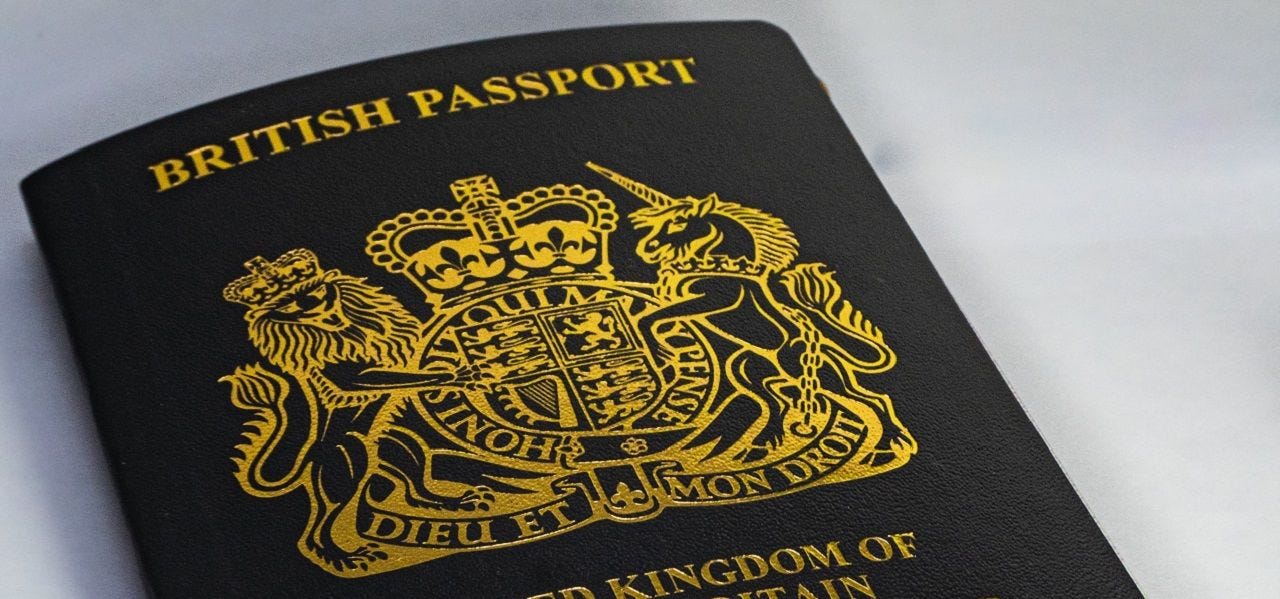Why trans women aren’t women (Part 1)
Analogies with adoptive parenthood and naturalised citizenship don’t work
When I was planning my book, I wrote a detailed outline—a necessity for finding a publisher, given that I was a first-time author and the topic was wildly controversial, but also extremely useful when it came to writing. My first draft was very close to that outline (before publication the material was significantly reorganised in response to requests by my excellent editor, which greatly improved the flow). But a few things I had thought would be included fell by the wayside during the process. One of them was a section debunking the various arguments I had come across for the proposition that “trans women are women” (henceforth TWAW).
I left this bit out in part because it slowed everything down. But mostly it was because those arguments were silly, and the people who believe, or claim to believe, that TWAW don’t by and large do so for logical reasons but for emotional and political ones—and they’ll tell you that, too, with slogans such as “No debate”. As Christopher Hitchens used to say: “That which can be asserted without evidence can be dismissed without evidence.” But I’ve thought ever since that it would be useful to do a collective debunking—less to potentially change any minds than for the intellectual satisfaction.
The four arguments I’ve come across are these:
TWAW are women in the same way that adoptive parents are parents.
TWAW in the same way that naturalised citizens are citizens.
TWAW because the definition of women should include them, morally and politically speaking.
TWAW because their feeling that they are women makes them like women in the ways that count (this one is a bit over-abbreviated; I’ll be fairer to it further down).
This week, I’ll consider just the first two.
The adoption analogy was, to my knowledge, first aired in a blog in 2018 by Sophie Grace Chappell, a philosopher at the Open University who started to identify as a woman in 2014, around age 50. It’s received surprisingly positive commentary from usually hard-headed philosophers, including Brian Leiter, who has been a severe critic of the social-justice turn on campus and also very supportive of Kathleen Stock, the University of Sussex philosopher hounded out of her job for gender-critical views. After some pondering, I’ve concluded that it has so many fans because people so badly want to have some reason, any reason, why men should count as women—and this analogy is superficially quite appealing, so they fall on it with tears of joy and strategically refrain from poking it to see where it falls down.
After all, parenthood is a social role that is usually but not necessarily tied to a biological fact (becoming pregnant or impregnating), and which it’s usually but not always reasonable to ignore the difference between the two. You can see why someone who’s desperate to argue that TWAW would find such an analogy irresistible. The trouble is that, when you look closely, it fails to elucidate anything.
New Zealander Holly Lawford Smith, a philosopher and author of a recent book, “Gender-Critical Feminism”, has already done a pretty thorough rebuttal of Chappell’s article. Her most important point is that there is no such thing as “womanning”—no common project or activity that both actual women and men who identify as women do that plausibly unites them in a single category for at least some purposes, as “parenting” does for both natal and adoptive parents.
What makes a man into a “transwoman” is his desire to be a woman, or his strong feeling that he was meant to be a woman, or already is one in some indefinable sense. These are mental states that can be experienced only by men. No woman can think she really should have been a woman, or eat her heart out in wanting to be one—she is one, and can’t stop being one even if she doesn’t like it. Whatever women—aka adult human females—do, that is “what women do”—aka “womanning”—simply by definition. And whatever men, or adult human males, do—including wishing they were women, getting surgery to look more like women, trying to force everyone else to call them women—is “manning”, or behaving like a man.
I supposed you could try to say that “womanning” is a cluster of activities, with none of them on its own being dispositive, but all of them more typical of women than of men to such an extent that if you do enough of them it would be reasonable to class you as a woman, at least socially. Women and men do, on average, have somewhat different personalities, interests, tastes and aptitudes.
But this approach has several fatal flaws. One is that such differences between the sexes aren’t so large that you could reasonably say a particular man behaves so atypically for men that he would fit better in womanhood than in manhood. There are plenty of atypical people of both sexes who don’t draw the conclusion from their non-conformity that they are thereby not members of their sex.
Another is that the main on-average differences between men’s and women’s activities are to do with their bodies, in particular their reproductive systems—and so any “male woman” would inevitably be highly atypical. You can’t sidestep this by pointing out that some women are infertile, or post-menopausal, or lack wombs: the whole point of this line of argument would be to say that a particular man “womans”, or “fits more comfortably in the woman box than the man box”, and so comparing them to atypical women is an obvious fail.
A third is that gender identity is self-defined, whereas if you define “womanning” as “being typically womanly”, you would have to set objective criteria for inclusion in the class of women. If “transwoman” means “man who is so atypical for his sex that he fits much better into womanhood”, you couldn’t support self-ID. You wouldn’t think Alex Drummond, with his beard and self-satisfaction and male entitlement was a woman: he doesn’t “woman” in any sense beyond wearing a skirt and eyeliner. You wouldn’t think that a transman who gets pregnant, or a transwoman who’s a father (or indeed a rapist), was “manning” or “womanning”. Each is engaged in projects that are typical of their actual sex, and completely foreign to their desired one.
Lawford-Smith’s article is pretty thorough. But I think omits yet another big reason why the adoption analogy doesn’t work, and that’s because parenting by adoption isn’t something you can decide to do without other people’s consent. Nowadays adoption is highly regulated, and adoptive parents have to jump through hoops before even being considered for a child. But even back when it was done very casually—think of “Anne of Green Gables”, when it was possible to send a message by a friend to an orphanage saying you wanted a likely lad to work on the farm, and someone would be coming round to pick one out next Friday—you couldn’t just swoop down on any child you fancied and declare yourself its parents! That, not carefully gatekept process of modern adoption, is what would be analogous with gender self-ID.
Chappell carefully conceals this difference between gate-keeping and self-ID in both adoption and trans identification, in part by the use of emotive language. Take this passage:
Nobody sensible thinks that it’s all right, when you find out that someone is an adoptive parent, to get in her face and shout “Biology! Science! You’re running away from the facts! You’re delusional! You’re not a real parent!” That would be incredibly rude and insensitive. It would upset her family. It would be importantly false: there is a perfectly good sense in which an adoptive parent most certainly is a real parent. Yet since this aggressive accusation is also, alas, only too intelligible to the parent who is subjected to it, it would also be stamping up and down in the crassest and cruellest way on what anyone can see at once is very very likely to be a sore point for her. (Here I speak, I’m sorry to say, from personal experience of analogous shoutings.)
Here Chappell is leading us to imagine a genuine adoptive parent: someone who’s been accepted by the state as a suitable parent for a child who would otherwise have none, and who is parenting well. But the analogy with self-ID requires us to include someone who simply says they’re an adoptive parent without ever looking after a child (“parenting”), or who swoops down on a child and tries to take them away on the grounds that they are really its parents. I think I might raise my voice at someone who did that to my child.
As for the suggestion that adoptive parents are likely to feel deeply sensitive about that fact, this reads like projection with a touch of moral blackmail. Nowadays, most adoptive parents are quite open with everyone, including the child, about the fact of the adoption, and I don’t think there’s any reason to think it is so likely to be a sore point. Again, a false analogy is being smuggled through. A man who claims to be a woman knows the claim is to say the least shaky; an adoptive parent who does a great job of looking after the child may sometimes worry that they could do better, but what parent doesn’t?
The following paragraph is also revealing:
Nobody sensible thinks that it’s an infraction of Jordan Peterson’s human rights to impose on him a social, ethical, and sometimes even legal requirement that he call adoptive parents parents.
I can’t really imagine circumstances in which Peterson would refuse to call adoptive parents parents. But I can easily imagine plenty of people who would: everyone who obeys certain versions of Islamic law. According to this code, caring for a child who is not yours biologically may be a praiseworthy act, especially if the child is an orphan—but doesn’t create a parental relationship. The thinking is that the legal fiction of adoption causes unacceptable harm by concealing or overwriting biological links so meaningful that they should never be erased.
Of course, if someone who adheres to this teaching lives in a country where (Western-style) adoption is allowed, they will have to accept that legally speaking, adoption does create a parental relationship. If they’re in an official position—a doctor or teacher, say—they would have to accept the legal framework within which they operate. But I can see no reason why anyone would be forbidden from saying, in a private capacity and politely, that they did not regard the adoptive relationship as a parental one. People are entitled to believe what they believe, and to say it too, as long as they are not harassing or endangering anyone.
I think Chappell is being misled into a more general authoritarianism by a desperate desire to make it impossible to state the obvious fact of other people’s sex, if those people don’t want you do. And in the service of this desire, there’s a conflation between what officials are obliged to do, and what private citizens are entitled to believe and say. But even this doesn’t really get at the full problem here. An official—a child’s teacher or doctor, or border-control guard—may have not only a duty to recognise a child’s legal parents as parents, but a duty to investigate and satisfy themselves that that is what they truly are. If a person claiming to be a child’s adoptive parent (or indeed birth parent) turns out to be lying, these officials not only may say so, but must.
This leads me on to the second analogy I’ll consider in this issue: that TWAW in the same way that naturalised citizens are citizens. I haven’t seen this written up anywhere, but I have heard it stated in person by Helen Lewis, a journalist at the Atlantic and formerly the New Statesman, and author of “Difficult Women: A History of Feminism in 11 Fights”.
I don’t think it works any better than the adoption analogy does, and largely for a single reason: that citizenship, unlike sex, is a purely bureaucratic matter. The question of someone’s citizenship is therefore relevant to other people only in certain special circumstances, all of them defined by the state. That is nothing like sex, which in almost all cases is obvious and relevant to everyone around you, which cannot be changed by any official procedure.
Males and females have existed as long as there has been sexual reproduction—that is, well over a billion years. Citizenship, by contrast, is a recent invention of humans. It’s not entirely divorced from material reality—most of us have at least one citizenship related to where we were born (jus soli) or to whom (jus sanguinis).
But which holds and for whom, together with any details or exclusions as well as procedures for naturalisation, all vary from place to place. My own children are UK citizens by right because they were born in the UK to legally resident parents (one of whom is a UK citizen). They are also Irish citizens by right since one of their parents is (that’s me). Irish citizenship is largely a matter of blood (my grandchildren, wherever they are born, will be granted it if they bother to apply). American citizenship is almost entirely about soil: if your mother has a toe on the ground when you come out and she isn’t a foreign diplomat, you’re a citizen. A few countries allow citizenship to pass from the father but not the mother. Some countries that expelled Jews during the second world war have special arrangements to grant their descendants citizenship as a form of atonement.
And for naturalised citizens it’s all bureaucracy. If I wanted to get UK citizenship I would have to fill in an onerous form, pass a test, pay a fat fee and satisfy reasonably stringent conditions, such as not having a criminal record or a history of overstaying my visa. And so again we have a big difference with self-ID: at best naturalisation can be analogous to a gate-kept system whereby a few people are allowed to count as members of the opposite sex after a rigorous selection process.
More fatal to the analogy, however, is that citizenship is primarily a relationship between the individual and the state, not between individuals. If you’ve heard me speak you’ll be able to tell I was brought up in Ireland, and you’ll guess that I’m an Irish citizen. If you know enough about UK law, you’ll know that gives me right of residence in the UK, even post-Brexit, and you might guess that I wouldn’t have bothered to get UK citizenship given that it’s expensive and grants me no extra rights (I’m even entitled to vote here, just as UK citizens are entitled to live and vote in Ireland).
But without asking, you can’t know for certain. And if I had a French or Polish accent, say, rather than an Irish one, you couldn’t be sure whether I had applied for permanent residency post-Brexit, or had become naturalised, or was living in the UK illegally—or indeed was a UK citizen by birth who had emigrated young and was brought up elsewhere. And you wouldn’t need to find out, or even have the right to, except in special circumstances, such as wanting to employ me or rent a house to me, or provide me with health care on the NHS or marry me and settle in the UK.
Even in these circumstances, you’d only need to know my citizenship because the government said you had to. In most cases, other people’s citizenship is entirely irrelevant to you. By contrast, the question of whether someone is a man or woman is material, in both the sense that it is physical and the sense that it matters.
When it comes to shared toilet or shower blocks, or whom you might share accommodation with, or sleep with or marry, it’s your sex that matters to your fellow citizens, not what’s written on a piece of paper. If you had a piece of paper with the wrong sex written on it—as many people now do—most other people, in such sensitive situations, will simply refuse to ignore the facts visible before their eyes. That is quite unlike citizenship, for which there’s no such thing as a piece of paper with the wrong citizenship written on it (I’m excluding forgeries, obviously). When it comes to citizenship, unlike sex, the piece of paper is all there is.
Next week (unless news intervenes) I’ll return to the final two reasons I’ve seen for claiming that TWAW, which are related and come out of philosophy departments. The first—and I’m not making this up, it’s a serious argument that’s been presented in academic journals—is that trans women are women because, morally and politically speaking, they should be.
The second, which developed out of picking holes in the first, is more complicated—as befits an attempt to fix a flawed model of reality by tweaking it, Copernicus-style. It claims that people with a “female gender identity” should count as women, where such an identity means having an “internal ‘map’ that is formed to guide someone who is subordinated on the basis of having actual or imagined bodily features that are presumed to be evidence of a female’s role in biological reproduction through the social or material realities characteristic of a person who is so subordinated”.
I’m sure you can’t wait!







